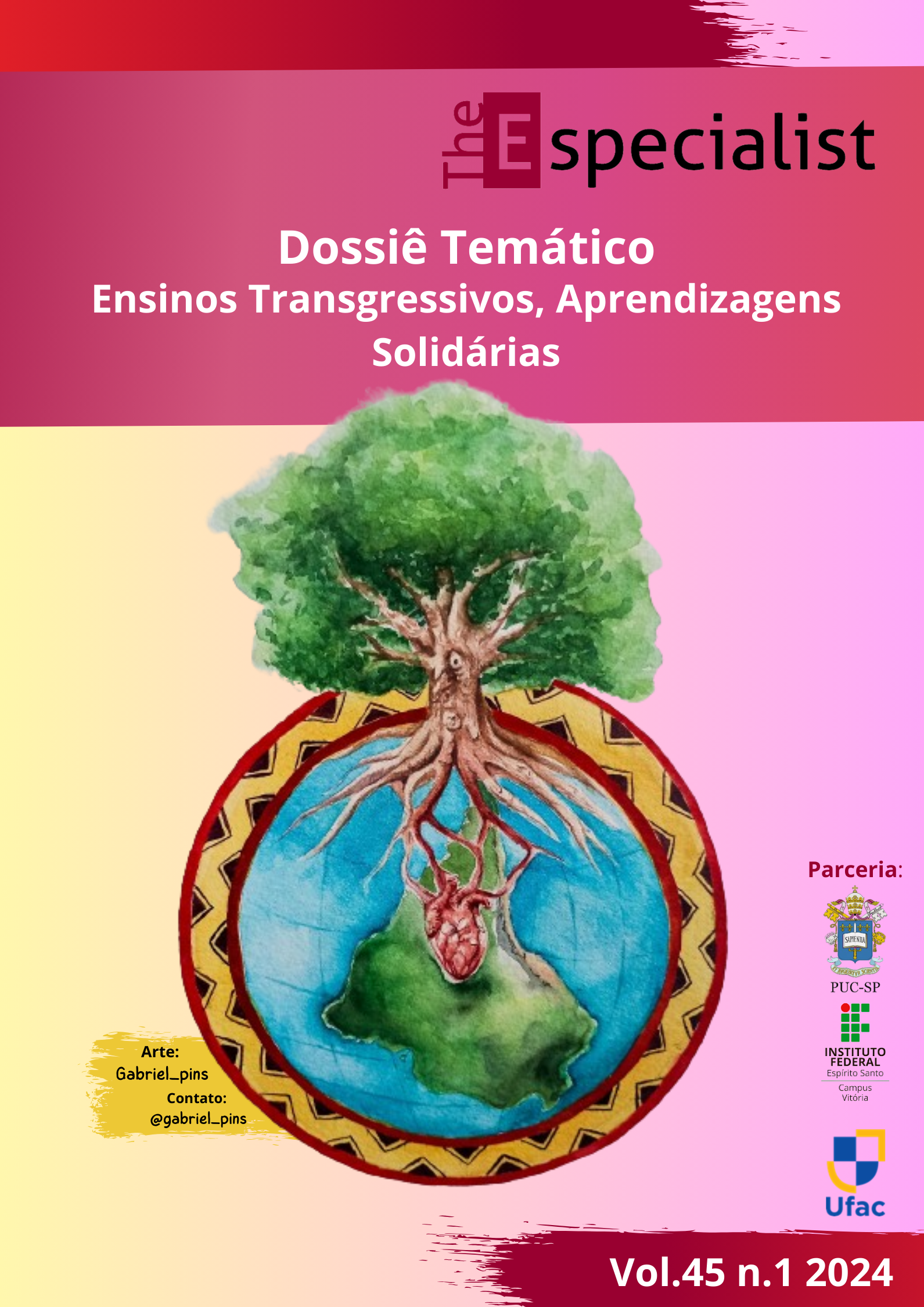Education for deaf students during the period of remote teaching in the covid-19 pandemic
a systematic review
DOI:
https://doi.org/10.23925/2318-7115.2024v45i1e64370Keywords:
COVID-19 pandemic, Deaf education, Assistive Technology, AccessibilityAbstract
The present study aimed to understand how educational institutions considered inclusive educational strategies for deaf students during remote teaching, given the social isolation caused by the COVID-19 pandemic. Regarding methodological procedures, it was carried out through a systematic review of the literature, with a qualitative approach. The results showed that schools adopted emergency measures to ensure that both students with disabilities – in this case, deafness – and students without disabilities had their rights respected and that their studies could continue, employing strategies to guarantee inclusion and accessibility for all . It was concluded that, for assistive technologies to be effective, it is crucial to invest in teacher training and ensure that they have access to the resources they need, truly implementing inclusive education.
References
ALVES, JF; GOMES, JS. Educação de pessoas surdas em tempos de pandemia: linguagem, pensamento e relações de poder. Revista Interinstitucional Artes de Educar, v. 6, p. 306-319, 2020. Disponível em: https://doi.org/10.12957/riae.2020.51903.
BRASIL, Lei nº 12.319, de 1º de setembro de 2010. Regulamenta a profissão de Tradutor e Intérprete da Língua Brasileira de Sinais - Libras. Disponível em: https://www.planalto.gov.br/ccivil_03/_ato2007-2010/2010/lei/l12319.htm.
BRASIL Lei nº 10.436, de 24 de abril de 2002. Dispõem sobre a Língua Brasileira de Sinais - Libras e dá outras providências. Disponível em: http://planalto.gov.br/ccivil_03/leis/2002/l10436.htm#:LEI20N2010.4362C20DE202420DE20ABRIL2002.
Checlist downs & black. Disponível em: https://cdn-links.lww.com/permalink/jps/a/jps_2020_03_05_heip_15-1405_sdc3.pdf.
CONFORTO, EC; AMARAL, DC; SILVA, SL. Roteiro para revisão bibliográfica sistemática: aplicação no desenvolvimento de produtos e gerenciamento de projetos. Trabalho apresentado, v. 8, 2011. Disponível em: https://shre.ink/nAnr.
CAPOVILLA, FC. Filosofias educacionais em relação ao surdo: do oralismo à comunicação total ao bilingüismo. Revista brasileira de educação especial, v. 6, n. 01, p. 99-116, 2000. Disponível em: http://educa.fcc.org.br/pdf/rbee/v06n01/v06n01a07.pdf.
Deepl Tradutor. Disponível em: https://www.deepl.com/pt-BR/translator.
GALVÃO TF, et al. Principais itens para relatar Revisões sistemáticas e Meta-análises: A recomendação PRISMA. Epidemiologia e Serviços de Saúde, 24(2): 335-342, 2015. Disponível em: https://www.scielo.br/j/ress/a/TL99XM6YPx3Z4rxn5WmCNCF/?format=pdf&lang=pt.
GALVÃO, MCB, RICARTE, ILM. Revisão Sistemática da Literatura: Conceituação, Produção e Publicação. LOGEION: Filosofia da informação, Rio de Janeiro, v. 6 n. 1, p.57-73, 2019. Disponível em: https://sites.usp.br/dms/wp-content/uploads/sites/575/2019/12/Revis%C3%A3o-Sistem%C3%A1tica-de-Literatura.pdf.
KRAEMER, GM, ZILIO, VM. Educação de Surdos na pandemia: a lógica contábil do sacrifício. Educação, Ciência e Cultura, Editora Unilasalle, v. 27, n.3, 2022. Disponível em: http://dx.doi.org/10.18316/recc.v27i3.10198.
DE QUADROS, RM; KARNOPP, LB. Língua de sinais brasileira: estudos lingüísticos. Artmed Editora, 2009. Disponível em: https://books.google.com.br/books?hl=pt-BR&lr=&id=_EJvlxL7Cd0C&oi=fnd&pg=PA9&dq=QUADROS,+Ronice+M.+A+L%C3%ADngua+de+Sinais+Brasileira:+Estudos+Ling%C3%BC%C3%ADsticos.&ots=vtl1XOUmNk&sig=p--oIxLvTpVP45LKxLXiWcwJ1Jc#v=onepage&q=QUADROS%2C%20Ronice%20M.%20A%20L%C3%ADngua%20de%20Sinais%20Brasileira%3A%20Estudos%20Ling%C3%BC%C3%ADsticos.&f=false.
SENA, LS; SERRA, IMRS; LIMA, MR. Ensino remoto emergencial e a mediação de intérpretes de Libras no município de Timon – Maranhão. Roteiro, v. 47, p. e27745, 2022.Disponível em: https://periodicos.unoesc.edu.br/roteiro/article/view/27745.
SIMÕES, RCS, NÓBREGA, PVA. Educação na pandemia: a realidade do ensino remoto para surdos no município de Pirpirituba/PB. Dissertação de Mestrado, 2020. Disponível em: https://repositorio.ifpb.edu.br/handle/177683/1192.
SHIMAZAKI, EM; MENEGASSI, RJ, FELLINI, DGN. Ensino remoto para alunos surdos em tempos de pandemia. Práxis Educativa, Ponta Grossa, v. 15, e2015476, p. 1-17, 2020. Disponível em: https://revistas.uepg.br/index.php/praxiseducativa/article/view/15476.
SOUZA, ALS, LEONOR, ACC, GEDIEL, ALB. Ensino Remoto e Acessibilidade na Educação de Surdos: uma análise crítica decolonial da plataforma “Se Liga na Educação”. RBECT – Revista Brasileira de Ciência e Tecnologia, p. 138-154. Ponta Grossa, 2022. Disponível em: https://revistas.utfpr.edu.br/rbect/article/view/14798.
STEVANIM, LF. Exclusão nada remota: desigualdades sociais e digitais dificultam a garantia do direito à educação na pandemia. RADIS: Comunicação e Saúde, Rio de Janeiro, n. 215, p. 10-15, 2020. Disponível em: https://www.arca.fiocruz.br/handle/icict/43180.
VYGOTSKY, L. S. A formação social da mente. São Paulo: Martins Fontes, 1991. Disponível em: https://edisciplinas.usp.br/pluginfile.php/3317710/mod_resource/content/2/A%20formacao%20social%20da%20mente.pdf.
Downloads
Published
How to Cite
Issue
Section
License
Copyright (c) 2024 The ESPecialist

This work is licensed under a Creative Commons Attribution 4.0 International License.
The authors grant the journal all copyrights relating to the published works. The concepts issued in signed articles are the absolute and exclusive responsibility of their authors.


 Esta obra está licenciada com uma Licença
Esta obra está licenciada com uma Licença 